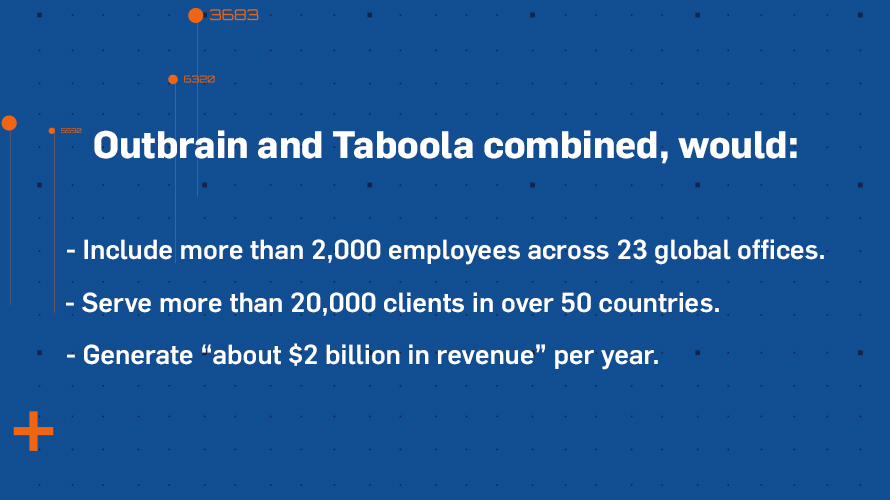Key Insights:
It was meant to be a merger that would drive “meaningful competition” for the walled gardens of Facebook and Google, but in the end, Outbrain and Taboola will continue its rivalry in the content recommendation space.
The collapse brought to an end a proposed merger that had been almost a year in the making with several sources familiar with the developments speaking with Adweek on the condition of anonymity about what transpired in the last 12 months.
What a difference a year makes

Under the terms of the merger agreement, Taboola founder and CEO Adam Singolda would head up the combined entity with the deal valued at $850 million. In return, Outbrain’s shareholders would receive shares representing 30% of the combined company plus $250 million in cash.
The company’s board of directors was to consist of both Outbrain and Taboola representatives with equal oversight of the planned integration.
The pair pitched the proposed union as benefitting the industry by offering advertisers greater scale with a combination of their data science teams facilitating more rapid product development. This was a “once in a lifetime” opportunity, Singolda told Adweek last October.
Scrutiny from regulators
Given Outbrain and Taboola’s dominance of the content recommendation market, some publishing sources expressed concerns over exactly how the proposed entity would operate.
The two competed intensely for years—often by matching, if not bettering—the revenue guarantees of their rivals when it came to contract negotiations with publishers. Some questioned if this would limit the choice of monetization partners for publishers.
Expectation were lofty, so the pair had to seek the approval of regulators in key markets, including Israel and the U.K. And despite the U.S. Justice Department giving the merger the all clear—the DoJ has Big Tech in its crosshairs—the others saw potential concerns.
The U.K.’s Competition and Markets Authority (CMA) launched “an in-depth investigation” after an initial probe in July, and the Israel Competition Authority’s investigation was still ongoing.
Sources familiar with both sides of the proposed merger said regulatory scrutiny took much longer that was previously expected, developments that brought pressure on its financing. The original financing deal with the banks participating expired in August.
Attempts to renegotiate
Similar to the rest of the online media industry, the economic impact of the Covid-19 pandemic also threw a wrench in the works.
As the ferocity of the cuts hit in late Q1 and early Q2, many ad-tech companies cited force majeure in an attempt to curb earlier revenue guarantees to publishers. Taboola also employed the tactic.
In a June 29 blog post, Singolda wrote, “We’ve had to ask our publisher partners to work with us through these challenging times by temporarily switching from a revenue guarantee to shared revenue.”
One source discussed how this could have played a role in the narrative that a combination of the two would harm publishers’ monetization options.
All of this transpired as the date for both parties to unilaterally walk away from the original agreement—Oct. 3, 2020—approached.
One source told Adweek that Taboola attempted to renegotiate the earlier agreed-upon fee of $250 million to approximately $100 million. That was deemed unacceptable by Outbrain, sources said.
https://www.adweek.com/programmatic/inside-the-collapse-of-ad-techs-once-in-a-lifetime-merger/

